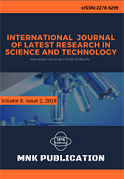DOI:10.29111/ijlrst ISRA Impact Factor:3.35, Peer-reviewed, Open-access Journal
Research Paper Open Access
International Journal of Latest Research in Science and Technology Vol.3 Issue 4, pp 97-103,Year 2014
Correspondence should be addressed to :
Received : 29 June 2014; Accepted : 10 August 2014 ; Published : 31 August 2014

| Download | 125 |
|---|---|
| View | 179 |
| Article No. | 10362 |
This study aimed to investigate the causal correlation between field-dependence/independence cognitive style and vocabulary learning strategies among Iranian EFL learners. 90 students majoring in English translation at Arak University were chosen. The participants were classified into two groups of field-dependent and independent based on the results of Group Embedded Figure Test (GEFT). Then, a vocabulary learning strategies questionnaire (Schmitt, 2000) was administered. The data was analyzed through structural equation modeling (SEM) statistical analysis. The results showed that there was causal correlation between field-dependent/independent cognitive style and vocabulary learning strategies. The result also revealed that field-dependent learners tended to use social strategies more than field-independent individuals while field-independent learners used cognitive and metacognitive strategies more frequently than field-dependent counterparts.
Copyright © 2014 Hamidreza Dowlatabadi et al. This is an open access article distributed under the Creative Commons Attribution 4.0 International (CC BY 4.0) license which permits unrestricted use, distribution, and reproduction in any medium, provided the original work is properly cited.
Hamidreza Dowlatabadi ,Mahvash Mehraganfar , " The Causal Correlation Between Field-dependence/independence Cognitive Style And Vocabulary Learning Strategies Among Iranian Efl Learners ", International Journal of Latest Research in Science and Technology . Vol. 3, Issue 4, pp 97-103 , 2014

MNK Publication was founded in 2012 to upholder revolutionary ideas that would advance the research and practice of business and management. Today, we comply with to advance fresh thinking in latest scientific fields where we think we can make a real difference and growth now also including medical and social care, education,management and engineering.

We offers several opportunities for partnership and tie-up with individual, corporate and organizational level. We are working on the open access platform. Editors, authors, readers, librarians and conference organizer can work together. We are giving open opportunities to all. Our team is always willing to work and collaborate to promote open access publication.

Our Journals provide one of the strongest International open access platform for research communities. Our conference proceeding services provide conference organizers a privileged platform for publishing extended conference papers as journal publications. It is deliberated to disseminate scientific research and to establish long term International collaborations and partnerships with academic communities and conference organizers.